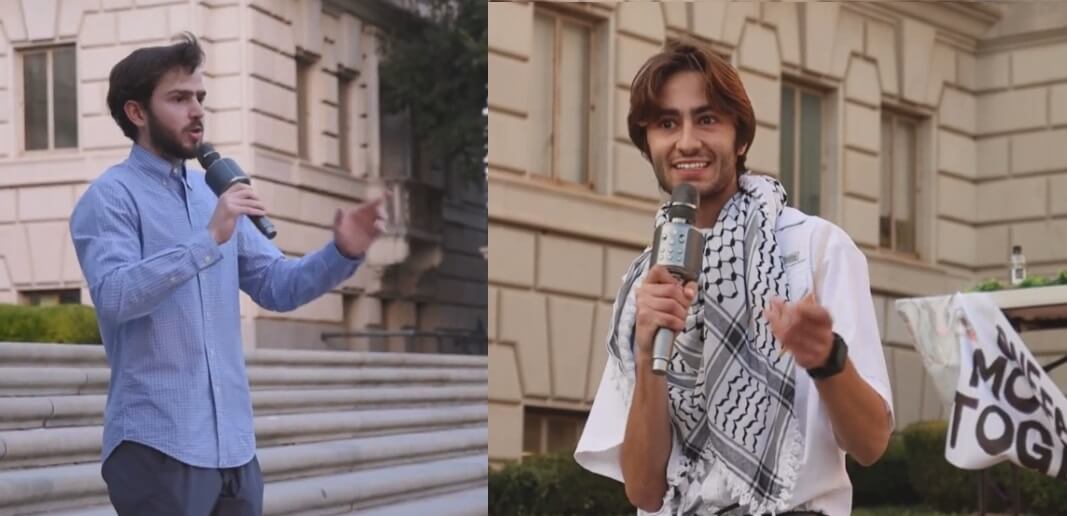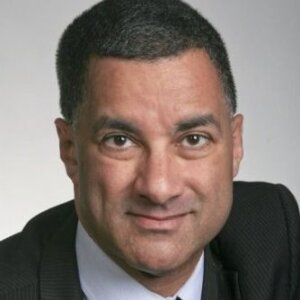A different campus story: Jewish-Palestinian cooperation
Atidna International seeks equal participation with three college chapters

University of Texas students Elijah Kahlenberg, left, and Jadd Hashem are the leaders of Atidna International, a joint group of Jewish/Israeli and Arab/Palestinian students. Courtesy of Atidna International, University of Texas at Austin
At a time when college campuses have become a battleground between Jewish and Palestinian students and their sympathizers, University of Texas students Elijah Kahlenberg and Jadd Hashem are eager to talk about their identities. And each other’s.
The Jewish and Palestinian American pair are the force behind Atidna, a student organization of Jews and Palestinians that began at the university’s Austin campus two years ago. Initially, it focussed on similarities between Jewish and Palestinian culture, Kahlenberg said on a call shared with Hashem, stressing “that Jews and Arabs are cousins in one family and we’re not inherent enemies.”
That was in the world before Oct. 7. Since then, the tenor of Atidna’s events have intensified, with gatherings both to mourn the dead on both sides of the Israel-Hamas war and to confront tough subjects rather than avoid them. The people showing up have strong opinions, Kahlenberg and Hashem said, but aren’t there to start a fight.
“I know many Palestinians who have never talked to an Israeli before. And I know many Israelis who have never spoken to a Palestinian before,” said Hashem, a sophomore from suburban Dallas majoring in government with a minor in Middle East studies. “I’m not afraid to call out people on the Palestinian or Arab side who are being hostile. Elijah, same thing for the Jewish side. But we also want people to hear what could be an uncomfortable conversation.”
Kahlenberg, who is from San Antonio and triple majoring in government, Middle East studies and Jewish studies, added, “The fact that they’re willing to be in a common space with a Palestinian or Jewish student is already in itself a kind of self-regulation of who’s joining.”
The group counts about 100 members, with another chapter of about the same size started at the University of Pennsylvania shortly before the war. A smaller chapter began last fall at Harvard.
Their largest activity was a vigil on Nov. 7, marking the first month of the war, attended by about 80 people of all backgrounds, Kahlenberg said. The pair spoke along with an imam, rabbi and priest in an event garnering media attention.
More intense dialogue continues at meetings that take place about every three weeks.
Many Israelis in the conversation said, ‘I’ve never heard that before in my life. That is a shocking experience. That’s not what we’re taught in Israeli textbooks.’ And just hearing that story from a Palestinian’s mouth, it’s not really preachy.
“Every dialogue session is co-moderated by Jadd and me,” Kahlenberg said. “At our UPenn chapter, it’s the president of that chapter — a Jewish girl — and her co-leader, a Kuwaiti Arab student. We definitely have to weed out some of the improper comments which do occur. But most of the time, it’s really just healthy disagreements.”
That sometimes means parsing the language each side uses. “When we talk about words like Nakba,” Hashem said, “it’s not necessarily disputing what it is as much as (understanding) what it means to the people.”
Kahlenberg picks it up, telling of the displacement of one member’s family in 1948.
“They went on what is known in Palestinian history as the Lydda Death March,” he said. “Many Israelis in the conversation said, ‘I’ve never heard that before in my life. That is a shocking experience. That’s not what we’re taught in Israeli textbooks.’ And just hearing that story from a Palestinian’s mouth, it’s not really preachy, it’s just talking about the family stories that have been passed down to you.”
The group was also deliberate in choosing its name. Atidna is from the Hebrew word atid, meaning “future,” with the Arabic suffix na for “our,” combining to mean “our future.”
Their actions are inspiring for that future, but I can’t help being a little skeptical. For starters, who’s funding them?
Nobody, both reply. As the founder, Kahlenberg did the work of obtaining 501(c)(3) nonprofit status for Atidna International, and the group is attempting to trademark the name.
That leads to another question: Are they affiliated with another group founded in Israel in 2018 that uses the name Atidna? It describes itself as a coalition of Arab citizens of Israel and Jews “from the National-Zionist camp in Israel.”
“It is sad that a right-wing group based out of Israel, which sadly does not stand for, in our opinion, truly unifying values, is trying to co-opt a name like Atidna,” Hashem said. “If anything, this gives us more incentive to continue using the name Atidna in order to reclaim it as a name for an organization that is actually working towards a just and equitable future between Jews/Israelis and Arabs/Palestinians.”
I also questioned them from an activist perspective, having grown up in the Civil Rights Movement and learned firsthand from its leaders. Wouldn’t they better exemplify an equal partnership between the two groups with co-leaders instead of a president and VP?
“We agree that everything is about optics, especially today, and ensuring complete equality, especially in each chapter’s leadership, is of utmost importance,” said Kahlenberg. “We encourage each chapter to rotate between Jewish/Israeli and Arab/Palestinian presidents. I am a junior, so after I graduate, Jadd, who is currently a sophomore, will take over as the president of Atidna at UT.”
Their involvement is more than academic or a notch on their resumes.
Hashem has family members directly affected by the war, who in December escaped Gaza for Egypt and the West Bank.
Though he has less of a direct connection, Kahlenberg said he is no less shaken by the conflict and moved to do what he can, at least among his college peers.
“It should be anyone’s position, whether it’s a Jewish baby or an Arab baby, that any loss of life needs to be considered a tragedy, right?” he said. “It’s in Jewish tradition that to destroy life is to destroy the whole universe. And I truly believe that.”
A message from our Publisher & CEO Rachel Fishman Feddersen

I hope you appreciated this article. Before you go, I’d like to ask you to please support the Forward’s award-winning, nonprofit journalism so that we can be prepared for whatever news 2025 brings.
At a time when other newsrooms are closing or cutting back, the Forward has removed its paywall and invested additional resources to report on the ground from Israel and around the U.S. on the impact of the war, rising antisemitism and polarized discourse.
Readers like you make it all possible. Support our work by becoming a Forward Member and connect with our journalism and your community.
— Rachel Fishman Feddersen, Publisher and CEO




























